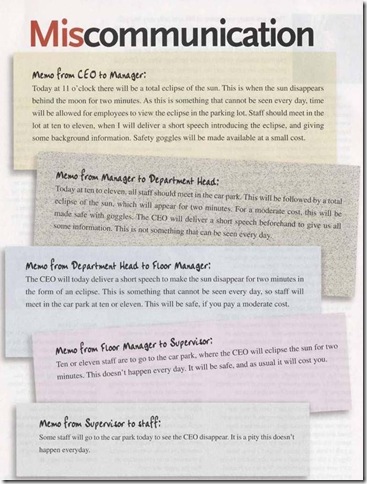I was playing Wii Sports with one of my mates, and meanwhile, one of the girls was doing a singing performance in front of others who were there. When this girl was halfway through her song, I turned my back on the TV for a second to listen to her, and when I turned back, I found that my mate had quit the game because I was winning. Actually, I wasn't winning. I was losing. But I had just scored a point.
And so, naturally, when I turned back to the TV, I had to say something in order to express my utter rage at my mate quitting. I can't exactly remember what I said, but it was something like, "That's so terrible." And, naturally, the girl singing thought that I was talking about her vocal ability, which is unfortunate, because she was actually very good. And she got quite upset.
It was a complete miscommunication. But it still hurt her, and made me very anxious. Take a look at these famous miscommunications (and then the picture, just for fun):
Through a miscommunication of orders, the Charge of the Light Brigade occurred. Approximately 670 horsemen began a headlong charge into a treeless valley with the objective of capturing some Russian field artillery at its end. Unknown to them, the valley was ringed on three sides by some 20 battalions of Russian infantry and artillery. The mistake happened when an enthusiastic Captain informed the Light Brigade to where they were going to attack, but in his excitement, he misstated the exact orders. No one knows for sure what was said, because he was killed in the charge.
History’s worst aviation disaster occurred in 1977 at foggy Tenerife in the Canary islands. The captain of a KLM flight thought the air traffic controller had cleared him to take off. But the controller intended only to give departure instructions. Although the language spoken between the Dutch KLM captain and the Spanish controller was English, confusion was created by heavy accents and improper terminology. The KLM Boeing 747 hit a Pan Am 747 at full throttle on the runway, killing 583 people.
There's a theory that days before Japan attacked Pearl Harbor, they sent a diplomat to Washington DC to deliver a formal declaration of war. However, the declaration was written in Japanese, and there wasn't anyone available to translate the declaration. As a result, Pearl Harbor became a unprovoked act of war, and became a rallying cry for Americans as they entered the war against both Germany and Japan.

So, what's my point? Why do I bring these examples of miscommunications up?
Because writing is all about communicating. I'm not an artist, but I know that art is about communication, too. You look at a painting, and it's like stepping into the mind of the artist, where you can perceive the communication of ideas and thoughts and emotions and experiences through lines and colour. I'm not a musician, but music is the same. Same with sculpting. All art forms are about communication.
I believe it was Paul Auster who said: "Every novel is an equal collaboration between the writer and the read and it is the only place in the world where two strangers can meet on terms of absolute intimacy." In other words, when you write, you are providing someone with a pathway to your mind. You are showing them something that has only ever existed in your mind.
And to show them, you must communicate. The best writing does this well. It nails descriptions on the head, and captures ideas or emotions in such a way that could not be achieved easily. And when you try to describe the thought or emotion in your own words, you can't.
For example, last year when I was plotting out some backstory for my novel, I had to work out why a certain character doesn't tell another certain character about a certain something, even though if they were to tell the other person, there would be a lot less pain and negativity. Now, I'm writing a fantasy, so I could have made that reason anything.
(Example: Person A could not tell Person B about Situation X because Person A was bound by magic.)
But no, I struggled with this question for hours, until I finally had a stroke of genius and decided to make the reason emotional. Awesome. My day had just got a hundred times better.
And then I tried to write this emotion down. I couldn't. I tried again. I couldn't. I spent the rest of the afternoon, three pages of refill and two pages of my writing notebook, just trying to write down this emotion. Because I knew that if I didn't nail it, the story would become highly unbelievable and unsatisfying.
So, avoid miscommunications in your writing. Avoid anything less than perfect communication in your writing. And in real life, too. Save everyone some awkwardness.

